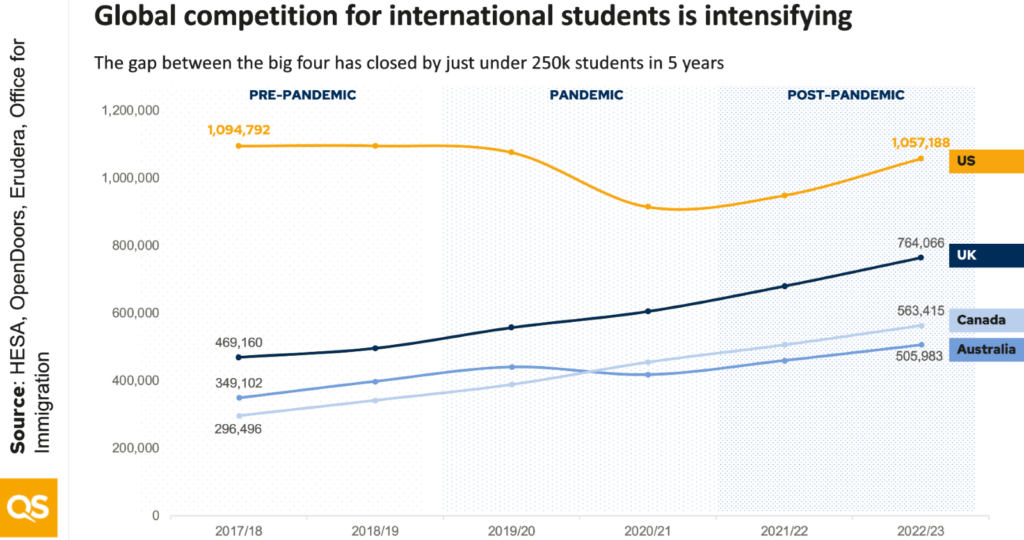
Helping students make the right decision is the central tenet of student recruitment teams. We are fortunate that, at QS, we have regional experts who can use their knowledge to tailor their approach to student recruitment depending on where a prospective student is from. Michelle Arikpo, QS Regional Director for Africa, has been with us for three years – explore how she ended up in student recruitment and what trends she’s seeing working with African students.
Please can you take us through your work experience?
Following my completion of the National Youth Service Corps in Nigeria, I worked as a student counsellor, guiding students into the right university for them. I also worked in business development, helping grow opportunities in Nigeria. I then joined StudentApply as a Student Recruitment Manager. Following QS’ acquisition of StudentApply, I transitioned into the role of Regional Director, overseeing our student recruitment operations in Africa.
Your role at QS
I oversee regional teams, source recruitment partners, and organise events primarily in Nigeria, Ghana, and East Africa, with a focus on driving student recruitment. I look for new university partners, boost recruitment for existing partner universities, and devise marketing strategies to enhance student recruitment.
Did you know? Over 60% of students from Nigeria expressed a preference for postgraduate taught programmes
Additionally, I expand our African recruitment network, foster strategic partnerships, and liaise with QS partner universities globally regarding student admission cases.
Why do you like working in student recruitment and how did you get into it?
Working in student recruitment means I can positively impact young peoples’ lives, engage with diverse communities, and build meaningful relationships. Working in this sector has provided me with a platform for continuous learning and personal growth, fostering creativity and innovation in developing recruitment strategies. I get a real sense of achievement from helping students navigate their educational journey, and witnessing their success serves is a driving force for me.
Do you have a favourite moment in your job?
My favourite moment in student recruitment is when I get to make an acceptance call to an excited prospective student. I also love leading engaging campus tours that showcase what the university is really like. Connecting with eager students at admissions events, celebrating graduates’ success stories, and fostering cultural exchange by supporting international students are all moments I cherish. It’s all about building strong relationships, providing personalised support, celebrating milestones, staying informed about industry trends, and embracing creativity in recruitment strategies.
What are the current student recruitment trends you’re seeing?
In student recruitment across Africa, several prominent trends have emerged.
There’s been a notable increase in demand for international education, driven by a growing middle class and a desire for globally recognised qualifications. Enrolment numbers have been steadily rising over the past decade, particularly in countries like Nigeria, Ghana and Kenya and other West and East Africa countries. QS data shows that Europe, North America and Australia are the big destination markets.
Additionally, there’s a shift towards digital recruitment strategies, leveraging social media, virtual events, and online platforms to reach and engage with prospective students. There’s a rising emphasis on personalised recruitment approaches, tailoring outreach efforts to individual student interests and preferences. According to QS International Student Survey 2023 data, 50% of prospective students from Ghana indicated social media was a useful tool for researching a university – the global average was 40%.
What challenges are the universities you recruit for facing?
Universities face several challenges in student recruitment, particularly in the current landscape. One prominent issue is the intensifying competition for students, both domestically and internationally, driven by demographic shifts and evolving student preferences.

Universities continue to grapple with the impact of the COVID-19 pandemic. It disrupted traditional recruitment strategies, necessitating a rapid shift to virtual engagement and digital marketing efforts.
There’s a growing concern about affordability and accessibility, as students and families increasingly prioritise value and return on investment when selecting educational opportunities. 58% of African respondents to the QS International Student Survey 2023 said their household income was less than $10,000. This concern is compounded by economic uncertainties and fluctuating funding levels, requiring universities to innovate and adapt to meet the evolving needs of prospective students while remaining financially sustainable.
Finally, policy changes in countries like the UK, Canada, and Australia have posed challenges to universities seeking to recruit students from Africa. For instance, stricter visa regulations and changes in immigration policies have increased the complexity and uncertainty surrounding the visa application process for African students, potentially deterring them from pursuing education in some of these countries mentioned. These policy changes underscore the importance of universities to diversifying their recruitment strategies and strengthening partnerships to navigate these challenges effectively.



